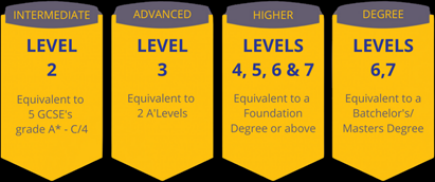Apprenticeships
There are four levels of apprenticeship

The different levels of apprenticeships start from Level 2 and go up to Level 7, all split across the categories listed above. Apprenticeship programmes can take between two to five years to complete, depending on the course.
What is a Level 2 apprenticeship?
A Level 2 apprenticeship is an intermediate apprenticeship. There are no formal entry requirements for Level 2 apprenticeships, and they’re a great stepping stone for progressing to a higher apprenticeship later on. Although it’s a different type of learning, these apprenticeships are typically regarded as equivalent to GCSE level.
What is a Level 3 apprenticeship?
Next up is Level 3, the advanced apprenticeship level, which is often the natural next step for learners who have completed Level 2. As with all levels, learners completing this apprenticeship will gain an accredited qualification, along with plenty of hands-on work experience.
It’s generally considered equivalent to two A Level passes, though entry requirements and required experience will vary depending on the employer.
What is a Level 4 apprenticeship?
Level 4 apprenticeships are the first of the higher apprenticeships, equivalent to the first year of an undergraduate degree. Despite being a higher level, learners must still meet the required roles and responsibilities to be accepted onto the apprenticeship.
What is a Level 5 apprenticeship?
The second level of higher apprenticeships is Level 5, equivalent to a foundation degree. As it’s a higher level, employers may set more specific entry requirements.
Due to the programme’s level, candidates might need to demonstrate a certain level of competency before being accepted. A skills scan may also be required to ensure their current role and responsibilities are suitable for the apprenticeship.
What is a Level 6 apprenticeship?
Level 6 apprenticeships are the first of the degree apprenticeships, equivalent to a bachelor’s degree, and are usually delivered by universities. Entry requirements vary, but may include specific qualifications such as GCSEs and Level 3 qualifications (e.g., advanced apprenticeships, A Levels, BTECs, or NVQs).
However, for candidates with industry experience, some training providers or employers may relax qualification requirements.
What is a Level 7 apprenticeship?
Level 7 apprenticeships are equivalent to a Master’s degree. As the highest level, they may have some entry requirements, which are set by the employer or provider. These might include:
A Level 4 or 5 apprenticeship or equivalent qualification
A Level 6 higher apprenticeship
Relevant industry experience
Like other apprenticeships, a Level 7 can be pursued after university, offering an alternative for graduates who wish to continue their education without completing a traditional Master’s degree. As the most challenging level, apprentices will face both academic and work-based demands, similar to those in a Master’s programme.
Our Apprenticeship Club
Embarking on an apprenticeship journey offers hands-on training and the chance to apply your skills in real-world settings. With diverse opportunities available, ranging from traditional trades to modern industries, there’s something for everyone. Apprenticeships should provide formal qualifications alongside valuable workplace experiences.
Our Apprenticeship Club offers comprehensive support at every stage:
- Finding Opportunities: We connect you with tailored apprenticeship programs that match your interests, skills, and goals.
- Application Assistance: Our team guides you through crafting resumes, cover letters, and application forms to make your application stand out.
- Interview Preparation: We provide coaching and preparation for interviews and assessment centre activities, helping you approach them with confidence.
Join our Apprenticeship Club today and open doors to exciting career prospects.

